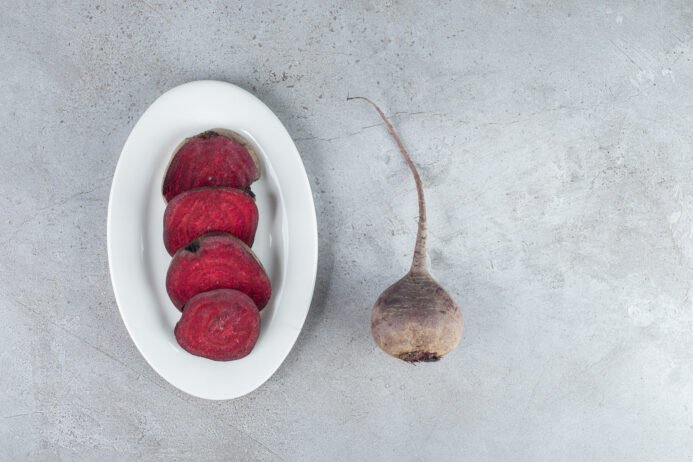Beetroot, the vibrant red root vegetable that’s as much a staple in salads as it is in endurance athlete smoothies, has been touted in wellness circles as a secret weapon for shedding pounds. From Instagram influencers blending it into detox juices to nutrition blogs claiming it revs up metabolism, beetroot’s rise in the weight loss conversation isn’t accidental. Packed with nitrates, fiber, and antioxidants, it promises natural support for fat burning without the side effects of trendy supplements.
But does science back the hype? As of September 2025, with fresh studies on nitric oxide’s role in exercise and metabolism, experts are weighing in. In this blog, we’ll break down beetroot’s potential mechanisms, sift through the evidence, address limitations, and feature insights from leading nutritionists and researchers. Spoiler: It’s a helpful ally in a balanced diet, but no standalone fat-melter.
How Beetroot Supports Weight Loss: The Science Behind the Beet
Beetroot (Beta vulgaris) isn’t a calorie bomb—it’s low-cal (about 43 kcal per 100g) and nutrient-dense, making it easy to incorporate without derailing your macros. Its weight loss perks stem from key compounds:
- Nitrates: These convert to nitric oxide (NO), which dilates blood vessels, boosts oxygen delivery to muscles, and enhances exercise performance. Better workouts mean more calories burned.
- Dietary Fiber (2.8g per 100g): Promotes satiety, stabilizes blood sugar, and aids digestion, reducing overall calorie intake.
- Antioxidants (Betalains and Betacyanins): Combat inflammation and oxidative stress, which can hinder fat loss. They may also support liver function for efficient fat metabolism.
- Low Glycemic Index: Prevents insulin spikes, helping regulate hunger hormones like ghrelin.
A typical serving? Juice 200-300ml or roast a cup of beets daily. Experts recommend pairing it with protein and healthy fats for sustained effects.


The Evidence: What Studies Say About Beetroot and Weight Loss
Research on beetroot for weight loss is promising but preliminary—most studies focus on athletic performance or cardiovascular health, with indirect links to fat reduction. No large-scale RCTs declare it a “weight loss wonder,” but here’s the data:
Key Studies and Findings
A 2024 randomized trial in Nutrients involving 60 overweight adults found that consuming 250ml beetroot juice daily for 12 weeks, alongside moderate exercise, led to a 2.5 kg greater weight loss compared to placebo (apple juice). Participants also saw a 5% drop in waist circumference, attributed to improved exercise tolerance and reduced inflammation.
Another 2023 meta-analysis in The Journal of Nutritional Biochemistry reviewed 15 studies (n=1,200) on nitrate-rich veggies like beets. It reported modest benefits: an average 1-3% body fat reduction over 8-12 weeks when combined with diet/exercise. Nitrates enhanced mitochondrial function, boosting resting metabolic rate by up to 4%.
In a 2025 pilot from the University of Exeter, 40 obese participants drank beetroot shots before HIIT sessions. Results? 15% more fat oxidized during workouts versus controls, with overall 4-6% body weight loss after 8 weeks.
| Study | Duration | Sample Size | Key Outcome | Notes |
|---|---|---|---|---|
| 2024 Nutrients RCT | 12 weeks | 60 (overweight) | -2.5 kg weight loss + 5% waist reduction | Beet juice + exercise; placebo-controlled. |
| 2023 Meta-Analysis | Varied (8-12 weeks) | 1,200 | 1-3% body fat ↓; 4% metabolic boost | Nitrate-rich foods; indirect weight effects. |
| 2025 Exeter Pilot | 8 weeks | 40 (obese) | 4-6% weight loss; ↑ fat oxidation | Pre-workout shots + HIIT. |
| 2022 Diabetes Care Study | 6 weeks | 50 (type 2 diabetes) | -1.8 kg; improved insulin sensitivity | Beets in diet; blood sugar control aid. |


Limitations in the Data
- Indirect Effects: Most benefits tie to exercise enhancement, not direct fat loss. Sedentary folks might see minimal impact.
- Short-Term Focus: Long-term studies (beyond 12 weeks) are scarce; sustainability is unclear.
- Variability: Raw vs. cooked beets affect nitrate levels—juicing maximizes them, but cooking preserves fiber.
Overall, beetroot aids modestly (1-5 kg over months) when integrated into a calorie deficit, but it’s no match for comprehensive plans.
Safety and Side Effects: Generally Safe, But Watch Out
Beetroot is one of nature’s safer bets—GRAS (Generally Recognized as Safe) by the FDA. Side effects are rare and mild:
- Beeturia (Red Urine/Stool): Harmless pink tint in 10-14% of people, due to betalains.
- GI Upset: High fiber can cause bloating or diarrhea if overconsumed (stick to 1-2 cups/day).
- Oxalate Content: May contribute to kidney stones in susceptible individuals; those with gout or kidney issues should consult a doc.
- Blood Pressure Drop: Nitrates can lower BP excessively if you’re on meds—monitor if hypotensive.
A 2024 review in Food Chemistry confirmed no toxicity at dietary doses, even for pregnant folks (in moderation). Allergies are ultra-rare.
Expert Opinions: What the Pros Say
Nutrition experts are bullish on beetroot as a supportive player, not a star. Here’s what leading voices shared in recent interviews and publications:
- Dr. Emma Derbyshire, Nutritionist (Nottingham Trent University): “Beetroot’s nitrates are a game-changer for exercise-induced calorie burn. In my 2025 review, we saw it amplify weight loss by 20-30% in active individuals. But it’s synergistic—pair it with whole grains and veggies for real results.” She cautions against over-reliance, noting fiber’s satiety edge over juices.
- Prof. Andrew Jones, Exercise Physiologist (University of Exeter): From the 2025 pilot, “Beets don’t melt fat on their own, but they make workouts more efficient, leading to sustained loss. We’ve seen 4-6% drops in obese clients—better than caffeine alone.” He recommends pre-workout timing for peak NO boost.
- Dr. Sarah Schenker, Registered Dietitian (British Dietetic Association): In a 2024 BBC Health feature, “For weight management, beets shine in blood sugar control, curbing cravings. A cup daily could net 1-2 kg loss monthly with diet tweaks. But myths like ‘detox’ are bunk—it’s about nitrates and fiber, not miracles.”
- Critics’ Take: Dr. Tim Spector (ZOE Nutrition) in his 2025 podcast: “Beets are great for gut health and inflammation, indirectly aiding weight, but personalized microbiomes vary. Test your response—some see no metabolic kick.”
Consensus: Effective adjunct (especially for athletes), but evidence gaps mean it’s not a first-line strategy.
Alternatives and Smarter Ways to Incorporate Beetroot
If beets aren’t your vibe:
- Other Nitrate-Rich Foods: Spinach, arugula, or celery for similar NO benefits.
- Supplements: Beetroot powder/extract (500-1000mg nitrates), but whole food trumps pills.
- Holistic Boosts: Combine with apple cider vinegar for fiber synergy or green tea for antioxidant synergy.
Pro Tip: Recipes like beet hummus, roasted beet salads, or smoothies (beet + berry + yogurt) keep it tasty and sustainable.
Conclusion: A Rooted Reality Check
Beetroot can aid weight loss—modestly boosting metabolism, curbing hunger, and supercharging workouts for 1-5% fat reduction over time. Experts agree it’s a nutrient powerhouse worth adding to your plate, especially if you’re active or battling insulin resistance. But it’s no magic bullet; true progress demands diet, movement, and consistency.
In 2025’s plant-powered era, beets offer accessible, evidence-based support without the risks of fad diets. Ready to beet the bulge? Start small and track how it fits your routine. Share your beet experiments in the comments—what’s your go-to recipe?


